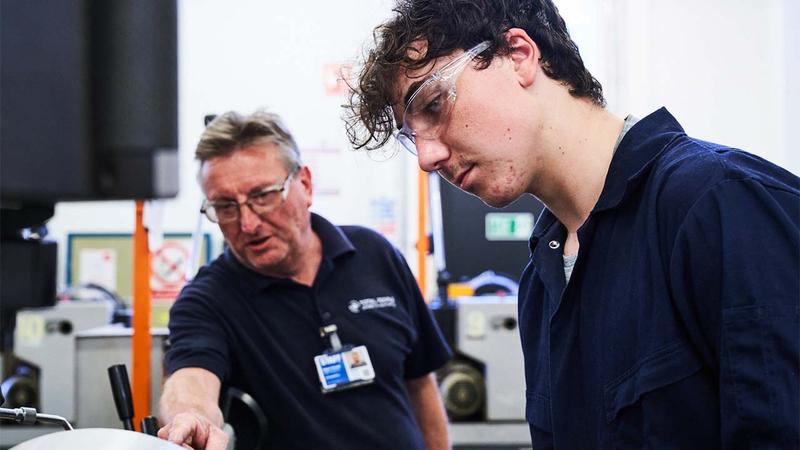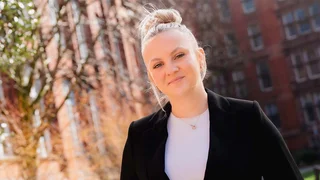With GCSE Results Day now just a few weeks away, young people across the UK are considering the next steps on their academic journey.
If that applies to you, have you considered applying for an apprenticeship as an alternative to A Levels or other college-based courses?
An apprenticeship is a way of studying for a qualification while earning a wage and gaining experience. Apprenticeships offer professional training and on-the-job learning in a range of sectors, including engineering, accountancy, and childcare.
To help you make an informed decision, we spoke to our Contact Centre Manager, Julie Podesta. Julie manages our Recruitment and Engagement teams, so is perfectly placed to answer some of the most common questions about apprenticeships.
Where can I find vacancies for apprenticeships?
There are lots of places that you can find access to vacancies for apprenticeships. The main area is the Find an Apprenticeship website. Within there, every training provider in the country advertises all of their vacancies.
Total People advertise all of our own vacancies on our website. There’s box at the top of the website that says ‘Vacancies’. If you click on that, it will show you all of our live vacancies from employers who are looking for a new apprentice, right now.
How many days will I be working or in the classroom?
You’ll be working for a minimum of 30 hours per week. Most apprenticeships are classed as full-time hours, so that could be 37 to 38 hours, but the minimum hours you can be doing on an apprenticeship is 30 hours.
For the classroom element, the national guidance is that every learner is given at least six hours study time per week. This depends on the programme that you're doing, and it can be in different formats.
For example, on some of our courses we do block release. Our learners may come to us for one week every couple of months. On other courses, it may be a couple of hours one day and a couple of hours another day.
Some of our courses are day release, and that's one day per week where you are out of your work environment and attend one of our sites, getting the knowledge, skills and behaviours required.
How do I know what level I should study?
The level you should be studying can be predetermined and judged by your eligibility, looking at previous qualifications that you've done, whether that’s vocational qualifications or GCSEs.
But with an apprenticeship, there are always progression options. What I would advise is for you to speak to us. We have a team of recruitment and engagement officers who can support you and answer those questions.
They will set up a one-to-one meeting with you. We'll look at your previous qualifications, look at what it is you want to do for a career and hopefully give you some really good advice and get you to where you need to be.
How much will I earn as an apprentice?
As an apprentice, the wage is no less than £6.40 per hour, and it depends at on your age and what stage of learning you’re at.
For example, if you’re under the age of 19 the apprentice wage is £6.40 an hour. If you’re aged 19 or above but in the first 12 months of your apprenticeship, the wage can be no less than £6.40 an hour.
But if you’re an apprentice who's been in learning for two years and you’re over the age of 19, then the national minimum wage will apply.
Again, there is lots of fabulous guidance on this on the Government website.
If you’re interested in an apprenticeship, you can either speak to our recruitment officers and we can help you, or you can look on the Government website and search ‘national apprenticeship minimum wage’, and you'll get lots of brilliant advice on there.
How will I be assessed on an apprenticeship?
Assessments on an apprenticeship takes various formats. Throughout your course, you’ll be assessed and checked by your learning coach. You'll have interaction with your learning coach weekly or monthly, however it's set up on your programme.
Most apprenticeships nowadays have what's called an End Point Assessment (EPA) and again, it varies on the programme.
If you’re doing a professional services qualification, your EPA may consist of a portfolio and a professional discussion with one of the examiners. For hairdressing, it would be an actual physical test and carrying out activities. For business administration, again, it may be a professional discussion.
It depends on the course that you're doing. The assessments take different formats based on the qualification that you’re working towards within your apprenticeship or the standard that you’re working towards.
What happens once I’ve completed my apprenticeship?
Once you've completed your apprenticeship, you’ve got a couple of options. There are always progression opportunities in apprenticeships.
For example, if you decided to choose a customer service apprenticeship with us, we offer a Customer Service Practitioner Apprenticeship at Level 2. If the work that you're doing within the organisation allows for it, we can push you to a Customer Service Specialist, which is a Level 3 qualification.
After that, if you want to go down that route, there are team leader and supervisor qualifications that you can complete as an apprentice and even operations and department managers after that, which is at Level 5.
Apprenticeships range from Level 2 up to Level 7. The sky is the limit. You can achieve a Level 7, which is equivalent to a degree level qualification, by studying as an apprenticeship. There is always that progression.
Some people want a break from learning once they've done an apprenticeship, which is fine because within an apprenticeship, you’re employed within an organisation. Once you've completed the apprenticeship you've still then got that job. You’re working within that environment and contributing to that organisation.
If you’re interested in an apprenticeship and want to learn more, find out which sectors we offer apprenticeships in and contact us today.

Our Apprenticeship Paths
Total People offer apprenticeships in a variety of different industries.
Explore


